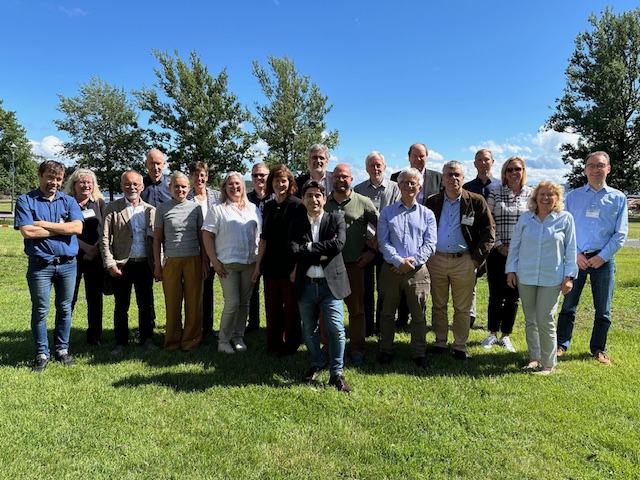
The IEA Solar Heating and Cooling Programme has strengthened its worldwide presence and broadened its range of research topics. During its Executive Committee meeting in Norway in June 2023 it welcomed Poland as a new member. Poland was among the top five countries in terms of new solar installations in Europe in 2023. Five Regional Sustainable Energy Centres built up by UNIDO also extended their membership for another two years until 2026. They are from countries in Africa, Central Asia and the Middle East. During the meeting in Norway a new research platform on solar photoreactors for fuels and chemicals was inaugurated. A second research group on PVT and solar air heating systems is under development.
Photo: IEA SHC Programme
“Participation in the IEA SHC Programme will significantly strengthen Poland’s capacity to achieve the objectives outlined in the Energy Efficiency Directive. Our membership will enable better preparation for implementing advanced energy technologies and strategies”, said Justyna Martyniuk-Pęczek Associate Professor at the Gdansk University of Technology in Poland, who has advocated membership for many years.
“We are in an exciting time in which the importance of low-carbon heating and cooling solutions is growing. Our program is uniquely positioned to meet this challenge as sustainable hybrid and integrated heating and cooling systems have always been part of our core activities. This meeting also gave us an opportunity to highlight the diversity of knowledge among our experts. For example, we just finished a very productive Task on Solar Neighborhoods, we saw excellent progress from our Task on Low Carbon Lighting, and we are just starting a new Task on Solar Photoreactors”, said Lucio Mesquita, Chair of IEA SHC.
One IEA SHC task that clearly demonstrates this willingness to cooperate is the Life Cycle and Cost Assessment for Heating and Cooling Technologies (Task 71). “We are cooperating with scientists from the field of biomass, storage, heat networks, heat pumps and photovoltaics to develop a cross-disciplinary methodology for calculating how life cycle analysis is carried out”, explained Karl-Anders Weiss, Chair of Task 71, during the ExCo meeting in Norway. There is already a first draft of the report, in which the methodology is described and the industrial partners fill in the data about materials, production processes and yields for very different heating systems.
Solar photoreactors for the production of fuels and chemicals
Technology development for solar reactors is the focus of a new task proposed by Bettina Muster-Slawitsch from the Austrian institute AEE INTEC. The group has decided to work on the topic at all three levels: materials and component development, reactor design as well as system integration. Possible applications include the production of hydrogen from wastewater, methanol from CO2 or photoelectrochemical ammonia production. The ExCo confirmed the new task on solar reactors. It will start in November 2024 and run for four years. Find further information here.
Next generation of PVT heating systems
A market-driven approach is being followed by Korbinian Kramer from the German institute Fraunhofer ISE. He suggested a new task on PVT liquid and air heating systems at the ExCo Meeting in Norway. His market-driven approach combines marketing with research activities. In order to strengthen this, he aims to involve representatives from research, industry and associations in the management of the working groups. It is planned that one group will carry out detailed monitoring of PVT heating systems. Another group will work on spreading technology-neutral information about these innovative heating systems while a third group will work on overcoming deficits and obstacles in the market framework. The next workplan definition meeting will take place at the Eurosun conference in Cyprus on Tuesday 26 August 2024 in the afternoon.
Arabic version of the Solar Heat Worldwide infographics
Since 2019 the UNIDO-coordinated Regional Sustainable Energy Centres have been sponsor members of IEA SHC. The centres have been officially mandated by the Ministries of Energy of their member countries and the ramping up phase was supported by UNIDO – the United Nations Industrial Development Organization. Five centres have confirmed their membership of IEA SHC for another two years, while UNIDO has paid the sponsorship fee: EACREEE (East Africa region), ECREEE (West Africa region), REEECH (Hindu Kush Himalaya region), RCREEE (Middle East region) and SACREEE (Southern Africa region).
RCREEE in Egypt has a special focus on standards and certification for solar water heaters. The centre initiated and supported the implementation of the SHAMCI collector label for many years. The RCREEE team translated the infographics with key data from the recently published Solar Heat Worldwide into Arabic. The English and Arabic versions of the Infographics are available for download here
ECREEE in Cape Verde – has profited already from the IEA SHC membership. In mid October 2023, the IEA SHC Solar Academy organized a solar cooling training course in Cape Verde for 27 experts from five countries in West Africa. “We aim at further capacity building for solar thermal professionals in our region and fighting the problems with low-quality, imported products by strengthening local producers”, explained Madi Kabore, ECREEE´s Programme Coordinator during the meeting in Norway. ECREEE aims at reactivating the SOLTRAIN West Africa Programme which already resulted in a number of market reports for Burkina Faso, Cape Verde, Ghana, Nigeria and Senegal in 2016.
by Bärbel Epp